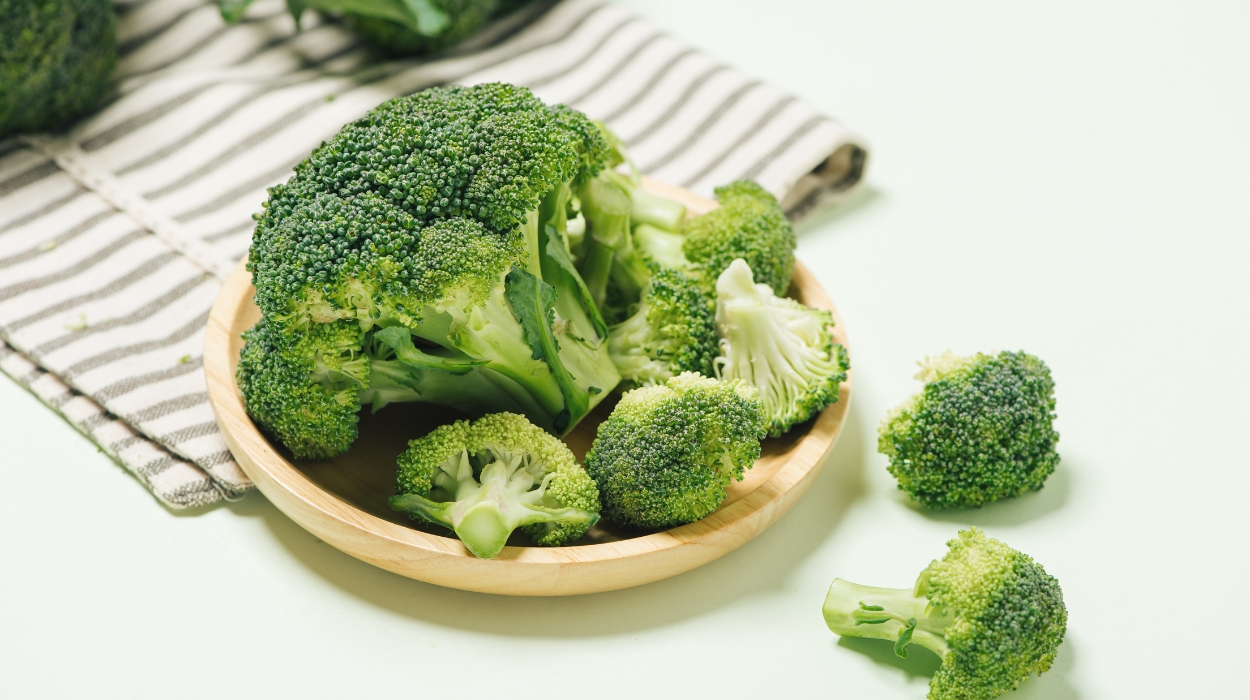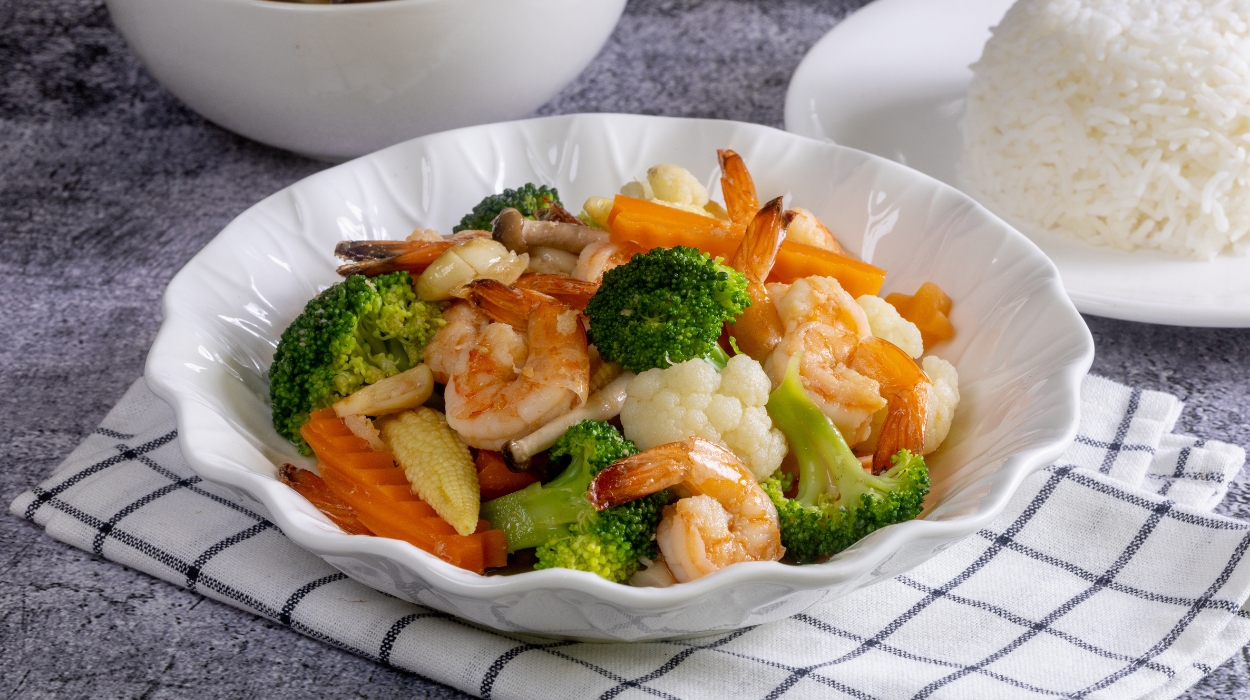Finding the right foods for weight loss can be challenging, and achieving weight loss often demands food sacrifices. But what if you could savor your favorite whilst also shedding pounds?
Cauliflower is a potential game-changer in the world of weight loss. Recently, cauliflower has become one of the most popular vegetables for both its weight loss benefits and versatility. When pursuing a healthier lifestyle, it’s easy to feel deprived of your favorite, comforting meals. Cauliflower can be used to marry the joy of indulgence with sustainable weight loss.
This article explores the question: is cauliflower good for weight loss? We’ll also look at what other health benefits this vegetable has to offer, alongside some healthy recipe ideas and precautions to take.
Does Cauliflower Help You Lose Weight?
Cauliflower can be a great option for weight loss due to its low-calorie, high fiber composition. This supports feelings of fullness and overall calorie control. Its versatility offers creative, nutritious alternatives to high-carb foods, helping you build healthier eating habits. While beneficial, weight loss relies on changes to overall dietary patterns and the maintenance of a healthy lifestyle.
Individual responses also vary, and excessive consumption may cause adverse effects. Overall, cauliflower’s nutritional composition makes it a great option for a healthy diet and can be easily incorporated into meals for weight loss.
Is Cauliflower Good For Weight Loss?

Packed with nutrients and low in calories, cauliflower offers many health benefits that can help weight loss.
First, cauliflower is low-calorie and high in fiber. One cup of chopped cauliflower[1] contains 27 calories and 2 grams of dietary fiber. Being so low in calories means you can consume multiple portions without worrying too much about weight gain.
Cauliflower’s fiber content helps you feel fuller for longer, potentially curbing overeating and snacking between meals. Diets higher in fiber are linked to better weight loss outcomes.[2] One study found that, compared to starchier and low-fiber vegetables, cauliflower consumption caused greater weight loss.[3]
Another great aspect of cauliflower is its remarkably low carbohydrate content. Per cup, this cruciferous vegetable[1] contains just 5 grams of carbohydrates, which is significant compared to starchy carbs like potatoes. This is particularly good if you’re monitoring your carbohydrate intake or following a low-carb diet, such as ketogenic or paleo diet.
Cauliflower is versatile and can easily replace high-calorie foods in various meals. Swapping out higher-carb foods with cauliflower will allow you to enjoy your meals while still supporting a healthy weight.
Remember that while cauliflower offers these benefits, it’s just one component of a healthy diet. Losing weight is a holistic process that involves a consistent, balanced diet, including plenty of fruit and vegetables and healthy lifestyle choices.
If you’re struggling to lose weight, there are plenty of weight loss supplements on the market that may be suitable for you. If you find it hard to eat lots of green vegetables and want to boost your vitamin and mineral intake, consider consuming a greens powder.
Other Benefits Of Eating Cauliflower
Aside from its weight loss benefits, cauliflower is good for you for other reasons too.
Cauliflower is an excellent source of vitamin C, providing 52 milligrams per cup,[1] which is over 50% of the daily recommended intake.[4] Vitamin C is essential for supporting your immune system and protecting body cells from damage. Cauliflower is an excellent source of antioxidants that reduce inflammation and protect you from chronic diseases.[5]
Eating cauliflower is also good for digestive health. It’s rich in fiber, which supports digestion and regular bowel movements. A healthy digestive system also supports better weight loss outcomes.[6]
Studies have shown that eating cruciferous vegetables, like cauliflower, may support heart health.[7] Higher cruciferous vegetable consumption can prevent calcification in the arteries, reducing your heart disease risk.
Cauliflower contains anti-inflammatory[8] properties. Chronic inflammation in the body is linked to many health issues, such as diabetes and cancer.[9] Including anti-inflammatory foods like cauliflower in your diet can help reduce your risk of these diseases.
Cauliflower is an extremely nutritious vegetable, containing many essential nutrients. Its B vitamins[10] are crucial for metabolism, energy production, and nervous system function. It also contains a high amount of vitamin K, which is essential for blood clotting and wound healing.
Ways To Include Cauliflower Into Your Diet

Cauliflower’s versatility means you can enjoy many of your favorite meals without compromising your fat loss goals. If you’re unsure how to add cauliflower to your diet or just need some inspiration, we’re here to help! Here are three healthy recipes incorporating cauliflower to get you started:
Cauliflower Pizza Crust
Ingredients:
- 1 medium-sized cauliflower
- 1 egg
- ½ cup grated Parmesan cheese
- 1 teaspoon dried oregano
- 1 teaspoon garlic powder
- Salt and pepper to taste
Instructions:
- Preheat oven to 400°F (200°C).
- Rice the cauliflower by grating it or using a food processor to chop it into fine pieces. Microwave for 5-6 minutes and allow it to cool.
- Squeeze out excess moisture from the cauliflower using a clean cloth or paper towel.
- Mix the cauliflower with the egg, Parmesan cheese, oregano, garlic powder, salt, and pepper.
- Shape the mixture into a crust on a baking sheet lined with parchment paper.
- Bake for 20-25 minutes until golden and firm.
- Add your favorite pizza toppings and bake for an additional 10-15 minutes. Enjoy your low-carb pizza!
Cauliflower Fried Rice
Ingredients:
- 1 medium-sized cauliflower head (riced)
- 1 cup mixed vegetables
- 2 eggs
- 2 tablespoons low-sodium soy sauce or tamari
- 2 cloves garlic (minced)
- 1 tablespoon sesame oil
- Green onions for garnish (optional)
Instructions:
- In a pan, heat the sesame oil over medium heat. Add minced garlic and saute for a minute.
- Add the mixed vegetables and stir-fry until they soften.
- Push the vegetables to one side of the pan and crack the eggs on the other side. Scramble the eggs until cooked.
- Mix the eggs and vegetables, then add the riced cauliflower and soy sauce.
- Stir-fry for 5-7 minutes until the cauliflower is tender but not mushy.
- Garnish with chopped green onions if desired, and enjoy your cauliflower rice!
Roasted Garlic Cauliflower Mash
Ingredients:
- 1 medium cauliflower head (cut into florets)
- 4 cloves garlic (minced)
- 2 tablespoons olive oil
- Salt and pepper to taste
- Chopped fresh herbs (parsley, thyme) for garnish
Instructions:
- Preheat oven to 425°F (220°C).
- Toss cauliflower florets and minced garlic with olive oil, salt, and pepper.
- Spread the mixture on a baking sheet and roast for 25-30 minutes until the cauliflower is golden and tender.
- Transfer the roasted cauliflower and garlic to a food processor and blend until smooth.
- Adjust the seasoning if needed and garnish with fresh herbs. This creamy cauliflower mash makes a great low-carb side dish.
These recipes show just how versatile cauliflower can be. Whether as a rice alternative, a healthier pizza, or a lighter side dish, cauliflower offers plenty of delicious options that align with your weight loss goals.
Potential Side Effects Of Eating Too Much Cauliflower
If you’re wondering whether eating cauliflower can cause gas, you may be eating too much. Consuming cauliflower in high volumes may cause digestive discomfort,[11] such as bloating, gas, or cramps. This is due to cauliflower’s high fiber content, so you may want to reduce your intake if you experience these symptoms.
For some people, overconsumption of cruciferous vegetables may affect iodine absorption,[12] which can affect thyroid function. If you are concerned about your thyroid, speak to a healthcare professional before including cauliflower and other cruciferous vegetables in your diet.
The high amounts of vitamin K in cauliflower may interfere with blood-thinning medications,[13] like warfarin if consumed in high amounts. If you take any blood thinning medication, make sure you seek advice from a healthcare professional before changing your diet.
As with most foods, moderation is key when eating cauliflower to avoid any potential side effects while enjoying balanced nutrition.
Conclusion
Cauliflower is an exceptional cruciferous vegetable if you’re looking to trim down your calorie intake. It has many remarkable attributes, including being low in calories and carbohydrates and high in fiber. These all work together to satiate hunger pangs, whilst maintaining a check on calorie consumption during your weight loss journey.
Aside from its weight-loss benefits, it also offers other benefits that can support your health. Cauliflower has been shown to improve digestive, immune, and cardiovascular systems. It also contains many of the essential vitamins that are key for overall physical health.
Cauliflower is incredibly versatile and can transform carb-heavy meals into lighter, nutritious alternatives. From healthier stir-fries and pizza to providing a lighter mashed potato alternative, you can still enjoy some of your favorites without compromising on taste.
Incorporating cauliflower into your diet may support your weight loss goals, whilst also boosting the nutritional value of your meals. Remember to speak to a healthcare professional if you have any thyroid issues and/or take any blood thinning medication.
Frequently Asked Questions
Cauliflower rice is an excellent choice for weight loss as it is low in calories and high in fiber, promoting fullness. It is a versatile, low-carb alternative to rice, supporting calorie control and weight management.
Eating cauliflower daily is generally fine, but excessive intake may cause digestive issues. If you have any thyroid issues or take blood thinning medication, talk to a healthcare professional before adding it to your diet.
Include cauliflower in your diet by swapping rice and other carbohydrates for cauliflower by using it as a pizza crust, shredded as rice or simply consuming it as a vegetable side with other meals.
Both broccoli and cauliflower are low-calorie, nutrient-dense options for weight loss. The choice depends on personal preference and nutritional needs. Both offer fiber, vitamins, and minerals to support a healthy diet.
 Evidence Based
Evidence Based